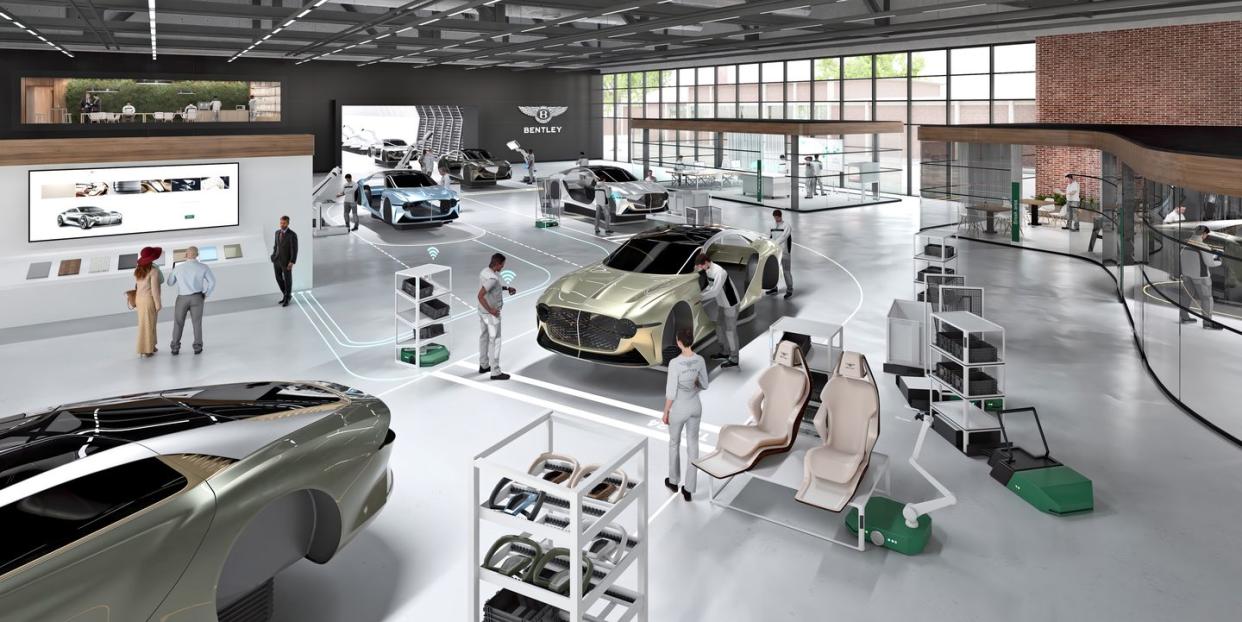Bentley Will Launch Its First Electric Vehicle in 2025

Bentley will launch its first battery-electric model in 2025, and plan for 100% of its vehicles to be electric by 2030.
The automaker is likely to use the upcoming VW Group SSP platform, arriving in 2025, for its first battery-electric model, which could be an SUV.
The automaker's planned Bentley Dream Factory will combine manufacturing with unique customer experiences, combining bespoke design choices with digital manufacturing concepts.
This week Bentley confirmed that it will produce its first EV in 2025, while committing £2.5 billion, or $3.3 billion, to the electrification effort, which is a part of its Beyond100 plan first revealed in 2020. The automaker plans to develop and produce its first EV in the UK, and will take a sharp turn toward battery-electric models soon thereafter, shooting for 100% of its lineup to be electric by 2030, and aiming to achieve end-to-end carbon neutrality by the same year.
That's right: Bentley plans to produce nothing but EVs starting in 2030.
"Beyond100 is the boldest plan in Bentley's illustrious history, and in the luxury segment. It's an ambitious and credible roadmap to carbon neutrality of our total business system, including the shift to 100 percent BEV in just eight years," added Adrian Hallmark, chairman and CEO of Bentley Motors.
Given the fact that Bentley is part of the Volkswagen Group, it could have fielded an EV even a couple of years ago if it really wanted to, so the barrier for Bentley has not been technological. Rather, it has more to do with market acceptance and the platform cycles of its parent company, in addition to investment cycles and product planning.
It is worth noting that 2025 is around the time that the VW Group's Scalable Systems Platform (SSP) will arrive, with Audi already scheduled to use SSP modules as a part of its Artemis project in 2025, followed by Volkswagen's Trinity project in 2026.
"After the Modular Electric Drive Kit (MEB) and the Premium Platform Electric (PPE), the SSP represents the next generation of all-electric, fully digital, and highly scalable mechatronics platform. In the future, it will be possible to build models from all brands and segments on the SSP—more than 40 million Group cars throughout its life cycle," Volkswagen noted earlier.
So when it comes to platform planning, Bentley's planned EV certainly fits within the SSP timeframe.
Just what battery-electric model are we likely to see from Bentley first?

Over the past two years, since Bentley first revealed the Beyond100 strategy, that first electric model has been widely expected to be an SUV. The Bentayga will likely be due to a redesign by 2025, so a next-gen model could very well kick off Bentley's electrification efforts.
It won't be long before the entire lineup is replaced with battery-electric models, which means the current lineup of internal combustion-engined Bentleys is really the last of their kind, with next-gen battery-electric models slated to roll out between 2025 and 2030. In the span of five years Bentley's entire lineup will go electric-only.
"Our aim is to become the benchmark not just for luxury cars or sustainable credentials but the entire scope of our operations. Securing production of our first BEV in Crewe is a milestone moment for Bentley, and the UK, as we plan for a long-term sustainable future in Crewe," Hallmark added.
One additional aspect of the automaker's plans concerns the Bentley Dream Factory, which is envisioned as a manufacturing space that will also offer unique customer experiences in the vehicle design and crafting process. The facility itself will involve an investment into the Crewe campus.
"With our new 'Dream Factory' concept, we now go to zero also with water, waste, and other environmental impacts until 2030," said Peter Bosch, board member for manufacturing at Bentley Motors. "Unique craftsmanship, customer interaction, and employee experience will be enhanced by digital tech, higher flexibility, and new ways of personalization."


